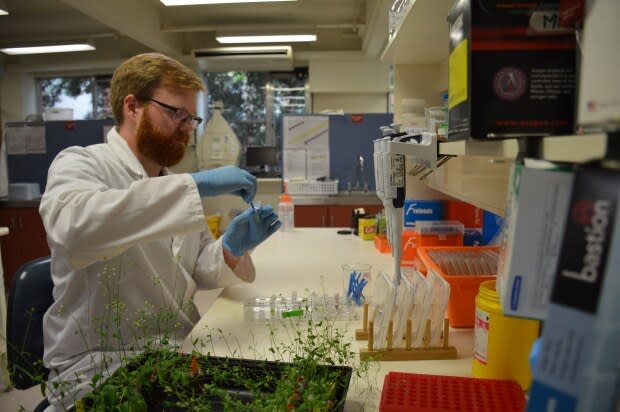Charlottetown candidates dig into new economy
Transforming the P.E.I. economy was a central question in the candidates' roundtable for the Charlottetown riding on Island Morning Friday.
All five candidates for the federal seat made it into the studio, and four of them expressed their hopes for new jobs in the province.
"We have a burgeoning biotech cluster here and that's because of smart people doing innovative things with the support of all levels of government," said Liberal candidate Sean Casey.
Casey said there is a need to watch for the next opportunity in the knowledge-based economy.
NDP candidate Joe Byrne saw that chance coming as Canada moves away from burning fossil fuels.

"If we're going to transition into sustainable energy then there's all kinds of opportunities, including lots of opportunities for P.E.I. in research and production."
Green candidate Darcie Lanthier said it is difficult to know what the next big thing is going to be.
"Most of the jobs in the new economy haven't even been invented yet," said Lanthier.
"What we need to do is help our young people be educated."

She noted the Green Party is proposing free post-secondary tuition to help prepare young people for those jobs.
Fred Macleod of the Christian Heritage Party said the province needs to support family farms and independent fishermen, but also look forward.
"The future is before us and we get to say where we're going to go with this," said Macleod.
Conservative candidate Robert Campbell was not as convinced of the future opportunities. Without the natural resources of other provinces, Campbell said the province needs to make the most of farming, fishing and tourism.
"Those are the only real substantial industries that sustain P.E.I.," said Campbell.
Housing crisis
Housing is probably the number one issue in Charlottetown, and all the candidates agreed action was needed.
Lanthier described an encounter she had while campaigning with someone who had nowhere to go.
"They were going to be on the sidewalk at three o'clock in the afternoon," she said.
"They're taking their stuff, including some beautiful pieces of furniture they inherited from mom and setting it out on the sidewalk — three o'clock in the afternoon in that storm. We're not doing enough."

The housing crisis didn't come out of nowhere, Lanthier said. It came out of bad planning.
"We're putting people in an impossible situation," she said.
"Long-term planning, not four-year election cycle planning, is what it's going to take to get ahead of the housing crisis."
Casey defended the government's approach, and noted that its housing strategy does cover the next decade.
"We need to plan on a longer horizon and engage other partners and that is really what's at the heart of the national housing strategy," he said.
Campbell said fixing the problem is going to take cooperation.
"The three levels of government have to get together and make a concerted effort," he said.
Byrne argued there is a fundamental problem with the current approach, and that is with private ownership of affordable housing.
"Where we dropped the ball 20 years ago is we stopped focusing on public housing," he said.
"We socialize the costs and privatize the profits."
Macleod said more needs to be done to control foreign buyers who own property but don't live in it, but are holding onto it as an investment.
More P.E.I. news


